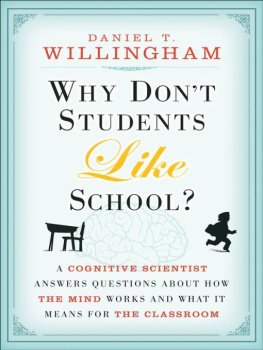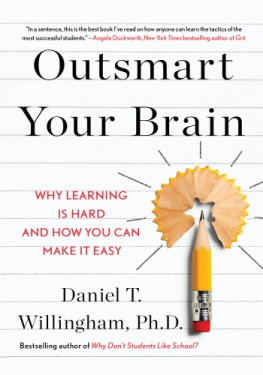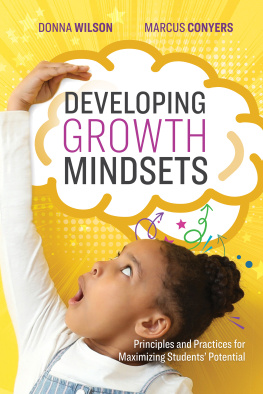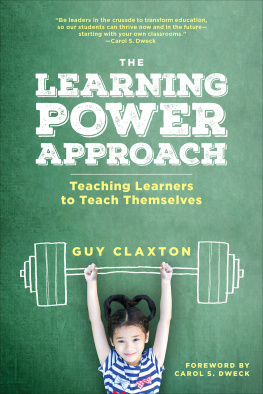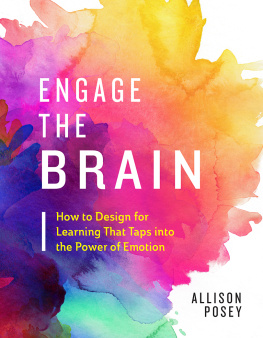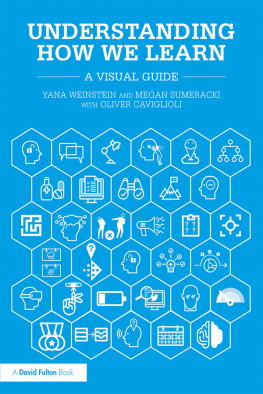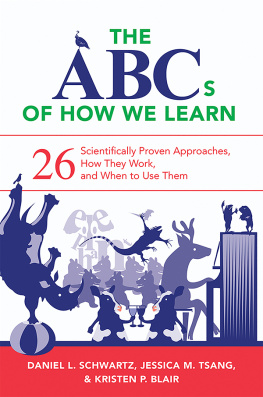Table of Contents
Copyright 2009 by John Wiley & Sons, Inc. All rights reserved.
Published by Jossey-Bass
A Wiley Imprint
989 Market Street, San Francisco, CA 94103-1741www.josseybass.com
No part of this publication may be reproduced, stored in a retrieval system, or transmitted in any form or by any means, electronic, mechanical, photocopying, recording, scanning, or otherwise, except as permitted under Section 107 or 108 of the 1976 United States Copyright Act, without either the prior written permission of the publisher, or authorization through payment of the appropriate per-copy fee to the Copyright Clearance Center, Inc., 222 Rosewood Drive, Danvers, MA 01923, 978-750-8400, fax 978-646-8600, or on the Web at www.copyright.com. Requests to the publisher for permission should be addressed to the Permissions Department, John Wiley & Sons, Inc., 111 River Street, Hoboken, NJ 07030, 201-748-6011, fax 201-748-6008, or online at www.wiley.com/go/permissions.
Limit of Liability/Disclaimer of Warranty: While the publisher and author have used their best efforts in preparing this book, they make no representations or warranties with respect to the accuracy or completeness of the contents of this book and specifically disclaim any implied warranties of merchantability or fitness for a particular purpose. No warranty may be created or extended by sales representatives or written sales materials. The advice and strategies contained herein may not be suitable for your situation. You should consult with a professional where appropriate. Neither the publisher nor author shall be liable for any loss of profit or any other commercial damages, including but not limited to special, incidental, consequential, or other damages.
Jossey-Bass books and products are available through most bookstores. To contact Jossey-Bass directly call our Customer Care Department within the U.S. at 800-956-7739, outside the U.S. at 317-572-3986, or fax 317-572-4002.
Jossey-Bass also publishes its books in a variety of electronic formats. Some content that appears in print may not be available in electronic books.
Library of Congress Cataloging-in-Publication Data
Library of Congress Cataloging-in-Publication Data
Willingham, Daniel T.
Why dont students like school?: a cognitive scientist answers questions about how the mind works and what it means for your classroom/Daniel T. Willingham.
p. cm.
Includes bibliographical references and index.
eISBN : 978-0-470-73044-7
1. Learning, Psychology of. 2. Effective teaching. I. Title.
LB1060.W5435 2009
370.1523dc22
2008043493
HB Printing
Acknowledgments
E smond Harmsworth, my literary agent, has been an asset every step of the way, starting with the initial concept. Lesley Iura, Amy Reed, and the whole team at Jossey-Bass showed great expertise and professionalism during the editing and production processes. Anne Carlyle Lindsay was an exceptional help with the artwork in the book. Special thanks go to two anonymous reviewers who went far above and beyond the call of duty in providing extensive and helpful comments on the entire manuscript. Finally, I thank my many friends and colleagues who have generously shared thoughts and ideas, and taught me so much about students and education, especially Judy Deloach, Jason Downer, Bridget Hamre, Lisa Hansel,Virkam Jaswal, Angel Lillard, Andy Mashburn, Susan Mintz, Bob Pianta, Ruth Wattenberg, and Trisha Thompson-Willingham.
For Trisha
The Author
Daniel T. Willingham earned his B.A. degree in psychology from Duke University in 1983 and his Ph.D. degree in cognitive psychology from Harvard University in 1990. He is currently professor of psychology at the University of Virginia, where he has taught since 1992. Until about 2000, his research focused solely on the brain basis of learning and memory.Today all of his research concerns the application of cognitive psychology to K-12 education. He writes the Ask the Cognitive Scientist column for American Educator magazine. His website is http://www.danielwillingham.com.
Introduction
Arguably the greatest mysteries in the universe lie in the three-pound mass of cells, approximately the consistency of oatmeal, that reside in the skull of each of us. It has even been suggested that the brain is so complex that our species is smart enough to fathom everything except what makes us so smart; that is, the brain is so cunningly designed for intelligence that it is too stupid to understand itself.We now know that is not true.The mind is at last yielding its secrets to persistent scientific investigation. We have learned more about how the mind works in the last twenty-five years than we did in the previous twenty-five hundred.
It would seem that greater knowledge of the mind would yield important benefits to educationafter all, education is based on change in the minds of students, so surely understanding the students cognitive equipment would make teaching easier or more effective.Yet the teachers I know dont believe theyve seen much benefit from what psychologists call the cognitive revolution.We all read stories in the newspaper about research breakthroughs in learning or problem solving, but it is not clear how each latest advance is supposed to change what a teacher does on Monday morning.
The gap between research and practice is understandable.When cognitive scientists study the mind, they intentionally isolate mental processes (for example, learning or attention) in the laboratory in order to make them easier to study. But mental processes are not isolated in the classroom.They all operate simultaneously, and they often interact in difficult-to-predict ways.To provide an obvious example, laboratory studies show that repetition helps learning, but any teacher knows that you cant take that finding and pop it into a classroom by, for example, having students repeat long-division problems until theyve mastered the process. Repetition is good for learning but terrible for motivation.With too much repetition, motivation plummets, students stop trying, and no learning takes place.The classroom application would not duplicate the laboratory result.
Why Dont Students Like School? began as a list of nine principles that are so fundamental to the minds operation that they do not change as circumstances change. They are as true in the classroom as they are in the laboratory* and therefore can reliably be applied to classroom situations. Many of these principles likely wont surprise you: factual knowledge is important, practice is necessary, and so on.
What may surprise you are the implications for teaching that follow.Youll learn why its more useful to view the human species as bad at thinking rather than as cognitively gifted.Youll discover that authors routinely write only a fraction of what they mean, which Ill argue implies very little for reading instruction but a great deal for the factual knowledge your students must gain.Youll explore why you remember the plot of Star Wars without even trying, and youll learn how to harness that ease of learning for your classroom.Youll follow the brilliant mind of television doctor Gregory House as he solves a case, and youll discover why you should not try to get your students to think like real scientists.Youll see how people like Mary Kate and Ashley Olson have helped psychologists analyze the obvious truth that kids inherit their intelligence from their parentsonly to find that its not true after all, and youll understand why it is so important that you communicate that fact to your students.

